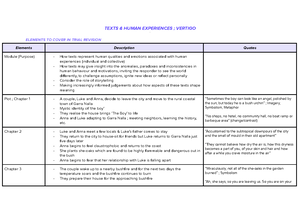- Information
- AI Chat
Was this document helpful?

Wes Hayden and Edmund Exley
find it impossible to create their
own destiny in life. To what
extent is this true in Montana
1948 and LA Confidential?
Both in Montana 1948 written by Larry Watson and LA Confidential directed by Curtis
Hanson, explore the struggle each of their characters faces in trying to lay down the path to
a future they want, due to their environment around them and their current circumstances
holding them back. The characters of both the novel and the book are apprehended by the
people of their time. Similarly, the ideals and antiquated views of their time hold them back
and limit them to walk their own path. Another thing holding them back is the reputation
and idea the public have of their personal and professional lives, not allowing them to create
their own destiny.
In both the novel and the film, characters can be seen following a path that has been well-
trodden before, and the characters and prevented from laying their own and unique path
down by the people around them. This can be seen clearly in the book as well as in the film.
This notion is specially brought to light in the book when Wesley tries to take proper legal
action against his brother’s transgressions, and he is held back by his father, who looks at the
job of a sheriff to be a person who “know[s] when to look and when to look away.” This
notion of corruption being forced upon a person who wants to do good and do his job the
right way is further explored in the movie, where corruption is the go-to and when Ed Exley
tries to do his job the right lawful way he is told to not “start trying to do the right thing, boy.
You haven't the practice,” forcing him to finally give up his dream to achieve justice lawfully
and be made to achieve justice the corrupt way. Or else leaving the killer of his father free
without facing any consequences for his actions. On the contrary, the transgressors and the
voice of justice of both the novel and the film are not given what they deserved. Dudley
Smith of LA Confidential is killed by Ed Exley who wants “to catch the guys who thought they
could get away with it,” but is forced to take action the corrupt and unruly way knowing well
that if he attempts at doing it the proper way, Smith a higher ranking officer in the police
department will get off easily and in the end due to Ed Exley’s circumstances and the people
pressuring him, his idea of it being “supposed to be about justice [is lost] somewhere along
the way.” Analogously, in the novel, Frank Hayden escapes from his consequences when he
decides to take his own life to escape from facing his punishment and the shame and
humiliation that comes with it. Even though Wesley believes “sins—crimes—are not
supposed to go unpunished,” he still does not take proper full legal action he would have
done if it was a stranger who committed the same crime, he chooses to do this in an attempt
to save his brother and his family reputation from being trashed and in the end he is forced
to leave as the person who did wrong. Likewise in the film Ed Exley is left as a hero, both not
deserving of what they got in the end.









